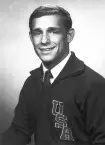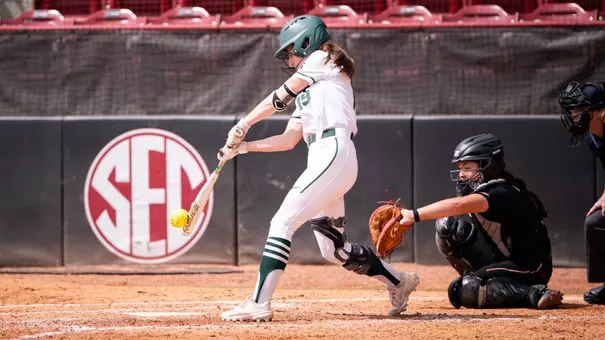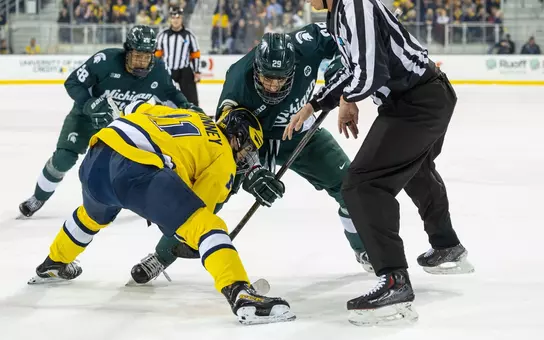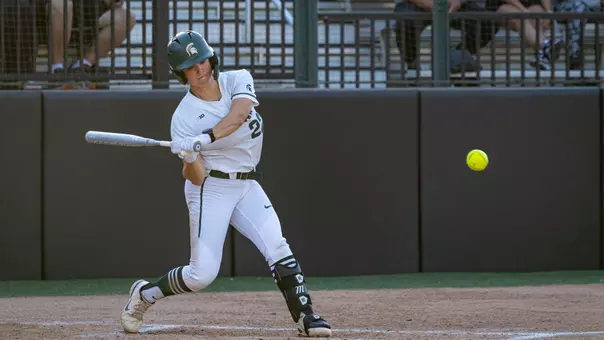Michigan State University Athletics
Hall of Fame

Don Behm
- Induction:
- 2016
- Class:
- 1967
Don Behm
Wrestling (1965-67)
Winnetka, Illinois
MSU Athletics Hall of Fame Class of 2016
HIGHLIGHTS:
• 1968 Olympic silver medalist in freestyle wrestling
• Two-time All-American (1965 & 1967) and Big Ten Champion (1965 & 1967)
• Part of MSU's 1967 NCAA Championship team, finishing as the national runner-up at 130 pounds
• Inducted into the National Wrestling Hall of Fame in 2004

HALL OF FAME FEATURE: CLASS OF 2016
Don Behm almost didn't come to Michigan State. But just over 50 years since he stepped foot on campus in East Lansing, Behm can't envision his life unfolding any other way.
"When Mark Hollis called to let me know I had been elected to the Hall of Fame, I just lost it," Behm said. "I live here in East Lansing; I've been a Spartan for 50 years. It was one ofthose emotional things that really hit me."
In a sport at Michigan State with a long list of individual honors and champions, Behm ranks among the best. He was a two-time All-American, first in 1965 as a sophomore and then two years later in '67 when he was the national runner-up at 130 pounds, helping the Spartans capture the NCAA Championship. Behm, who ranks seventh in MSU history in career winning percentage at .917 with a 66-6 record, also won a pair of Big Ten Championships in 1965 and '67. He was inducted into the National Wrestling Hall of Fame in 2004.
"I was originally going to go to Oklahoma State, but a month before I was supposed to go to school, I got a notice from the registrar at Oklahoma State saying I was denied," Behm explained. "My grades were adequate, so that wasn't the problem. I couldn't get ahold of the coach there, so I called Grady Peninger and he said he had a spot for me at MSU."
After officially becoming a Spartan and while back home in Winnetka, Illinois, for the weekend, Behm got a call saying there had been a mistake at Oklahoma State -- his application had landed in the wrong pile.
Too late, Behm was staying put.
"I felt comfortable at Michigan State and it certainly worked out," Behm said.
Prior to coming to Michigan State in 1963, Behm was selected to attend the United States Olympic Trials earlier that year. As one of the youngest wrestlers invited to the trials, Behm more than held his own at the event, foreshadowing the beginning of perhaps a then unsuspecting, but highly successful, international wrestling calling. Behm didn't lose a single match at the trials and wound up tying the eventual event champion that went on to represent the U.S. at the 1964 Olympic Games.
"I started to know I was on track at that point," Behm said.
Behm began to further develop at MSU, helping the program return to national prominence. A year after placing last at the 1964 Big Ten Championships, the Spartans took second in 1965 aided by Behm's first of two conference titles at 130 pounds. Behm was also named the Spartans' most outstanding wrestler that year.
The following year, 1966, Michigan State won the Big Ten title, beginning a string of seven consecutive conference crowns.
"All of my workout partners were All-Americans. We worked hard and everyone did what they had to do," said Behm.
After rolling to another conference title, the Spartans captured the National Championship during Behm's senior season in 1967. Behm recorded his highest individual finish as well, taking second in the nation at 130 pounds.
"Those were amazing times to be a Spartan," Behm said.
Coming off his best season and a team national championship, Behm then earned a spot to represent the United States in the 1968 Olympic Games in Mexico City.
"I was the youngest guy on the team at 23, most were 26, 27 or 28," Behm said. "The Russians kind of laughed at me because I had no cauliflower ears, so I couldn't be any good, right?"
Behm proved an intimidating presence didn't guarantee a place on the medal stand, or even success. He lost just once before taking on Russia's five-time world champion, Ali Aliyev, in a match that could earn Behm a medal.
"Looking across the mat at him, I'm thinking, `Jeez he's the best they've got,'" Behm recalled. "I remember looking around and seeing a small U.S. contingent, including my dad, and then I thought, `I'm the best we've got, let's go!'
"He shoved me as soon as the match started and I ended up off the mat, onto the floor," Behm said. "We got back on the mat, I pushed him as hard as I could and he didn't budge. We went back and forth for a bit, I pushed him later and he didn't push me back. That's when I knew I had him."
Behm had him, alright. He went on to defeat Aliyev, securing a Silver medal -- the highest medal ever won by a Spartan wrestler at the Olympic Games.
"The farther away from those experiences you get, the bigger to me they get," Behm said. "At the time, it was big, but not like it is now. It was my first Olympic experience, I had never been on any other world stage."
Having firmly established an international presence, Behm went on to win Gold at the 1971 Pan-American Games and was an alternate at the 1972 Olympic Games in Munich.
Behm, who retired as a longtime physical education teacher in the East Lansing school system in 2010, still lives in the area and continues to mentor young wrestlers.
"I'm a Spartan, Olympian and now I have the last chapter -- Hall of Famer," Behm said. "It has been a great journey. Life is great."
Wrestling (1965-67)
Winnetka, Illinois
MSU Athletics Hall of Fame Class of 2016
HIGHLIGHTS:
• 1968 Olympic silver medalist in freestyle wrestling
• Two-time All-American (1965 & 1967) and Big Ten Champion (1965 & 1967)
• Part of MSU's 1967 NCAA Championship team, finishing as the national runner-up at 130 pounds
• Inducted into the National Wrestling Hall of Fame in 2004

HALL OF FAME FEATURE: CLASS OF 2016
Don Behm almost didn't come to Michigan State. But just over 50 years since he stepped foot on campus in East Lansing, Behm can't envision his life unfolding any other way.
"When Mark Hollis called to let me know I had been elected to the Hall of Fame, I just lost it," Behm said. "I live here in East Lansing; I've been a Spartan for 50 years. It was one ofthose emotional things that really hit me."
In a sport at Michigan State with a long list of individual honors and champions, Behm ranks among the best. He was a two-time All-American, first in 1965 as a sophomore and then two years later in '67 when he was the national runner-up at 130 pounds, helping the Spartans capture the NCAA Championship. Behm, who ranks seventh in MSU history in career winning percentage at .917 with a 66-6 record, also won a pair of Big Ten Championships in 1965 and '67. He was inducted into the National Wrestling Hall of Fame in 2004.
"I was originally going to go to Oklahoma State, but a month before I was supposed to go to school, I got a notice from the registrar at Oklahoma State saying I was denied," Behm explained. "My grades were adequate, so that wasn't the problem. I couldn't get ahold of the coach there, so I called Grady Peninger and he said he had a spot for me at MSU."
After officially becoming a Spartan and while back home in Winnetka, Illinois, for the weekend, Behm got a call saying there had been a mistake at Oklahoma State -- his application had landed in the wrong pile.
Too late, Behm was staying put.
"I felt comfortable at Michigan State and it certainly worked out," Behm said.
Prior to coming to Michigan State in 1963, Behm was selected to attend the United States Olympic Trials earlier that year. As one of the youngest wrestlers invited to the trials, Behm more than held his own at the event, foreshadowing the beginning of perhaps a then unsuspecting, but highly successful, international wrestling calling. Behm didn't lose a single match at the trials and wound up tying the eventual event champion that went on to represent the U.S. at the 1964 Olympic Games.
"I started to know I was on track at that point," Behm said.
Behm began to further develop at MSU, helping the program return to national prominence. A year after placing last at the 1964 Big Ten Championships, the Spartans took second in 1965 aided by Behm's first of two conference titles at 130 pounds. Behm was also named the Spartans' most outstanding wrestler that year.
The following year, 1966, Michigan State won the Big Ten title, beginning a string of seven consecutive conference crowns.
"All of my workout partners were All-Americans. We worked hard and everyone did what they had to do," said Behm.
After rolling to another conference title, the Spartans captured the National Championship during Behm's senior season in 1967. Behm recorded his highest individual finish as well, taking second in the nation at 130 pounds.
"Those were amazing times to be a Spartan," Behm said.
Coming off his best season and a team national championship, Behm then earned a spot to represent the United States in the 1968 Olympic Games in Mexico City.
"I was the youngest guy on the team at 23, most were 26, 27 or 28," Behm said. "The Russians kind of laughed at me because I had no cauliflower ears, so I couldn't be any good, right?"
Behm proved an intimidating presence didn't guarantee a place on the medal stand, or even success. He lost just once before taking on Russia's five-time world champion, Ali Aliyev, in a match that could earn Behm a medal.
"Looking across the mat at him, I'm thinking, `Jeez he's the best they've got,'" Behm recalled. "I remember looking around and seeing a small U.S. contingent, including my dad, and then I thought, `I'm the best we've got, let's go!'
"He shoved me as soon as the match started and I ended up off the mat, onto the floor," Behm said. "We got back on the mat, I pushed him as hard as I could and he didn't budge. We went back and forth for a bit, I pushed him later and he didn't push me back. That's when I knew I had him."
Behm had him, alright. He went on to defeat Aliyev, securing a Silver medal -- the highest medal ever won by a Spartan wrestler at the Olympic Games.
"The farther away from those experiences you get, the bigger to me they get," Behm said. "At the time, it was big, but not like it is now. It was my first Olympic experience, I had never been on any other world stage."
Having firmly established an international presence, Behm went on to win Gold at the 1971 Pan-American Games and was an alternate at the 1972 Olympic Games in Munich.
Behm, who retired as a longtime physical education teacher in the East Lansing school system in 2010, still lives in the area and continues to mentor young wrestlers.
"I'm a Spartan, Olympian and now I have the last chapter -- Hall of Famer," Behm said. "It has been a great journey. Life is great."
Adam Nightingale Postgame Comments | Michigan | February 6, 2026
Friday, February 06
Robyn Fralick Post Game Comments | Maryland | Feb 4th, 2026
Wednesday, February 04
Pat Fitzgerald | Signing Day Press Conference | Feb. 4 2026
Wednesday, February 04
Adam Nightingale I Hockey Press Conference I February 3, 2026
Tuesday, February 03




